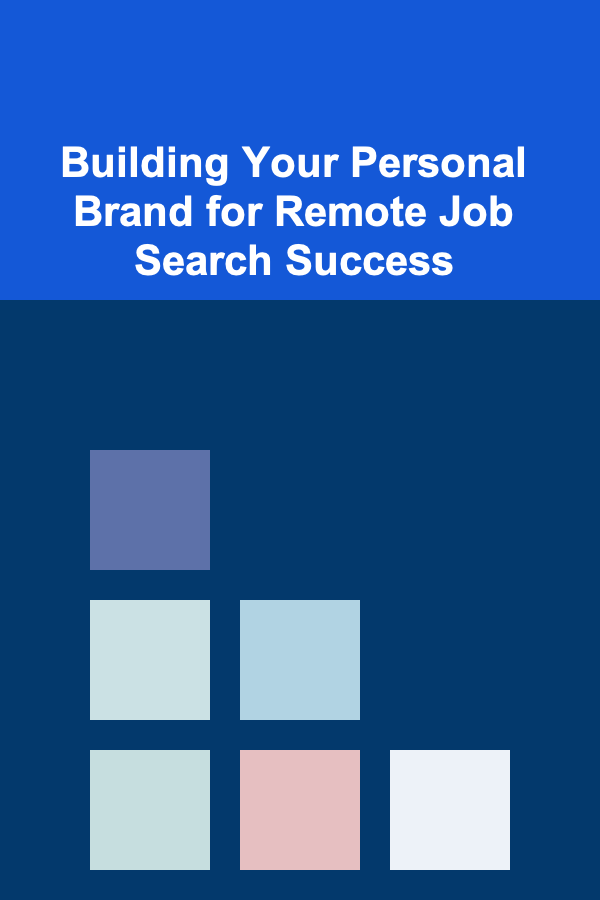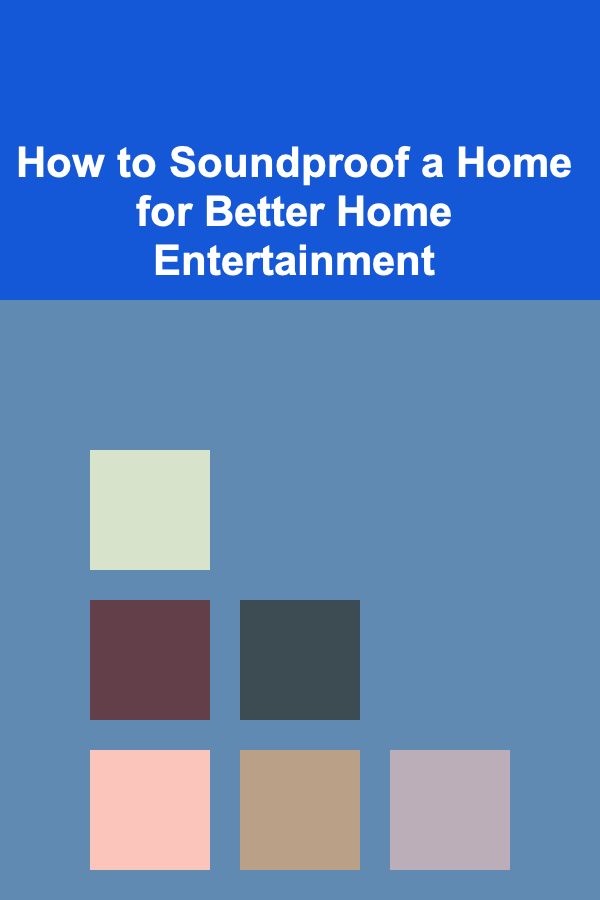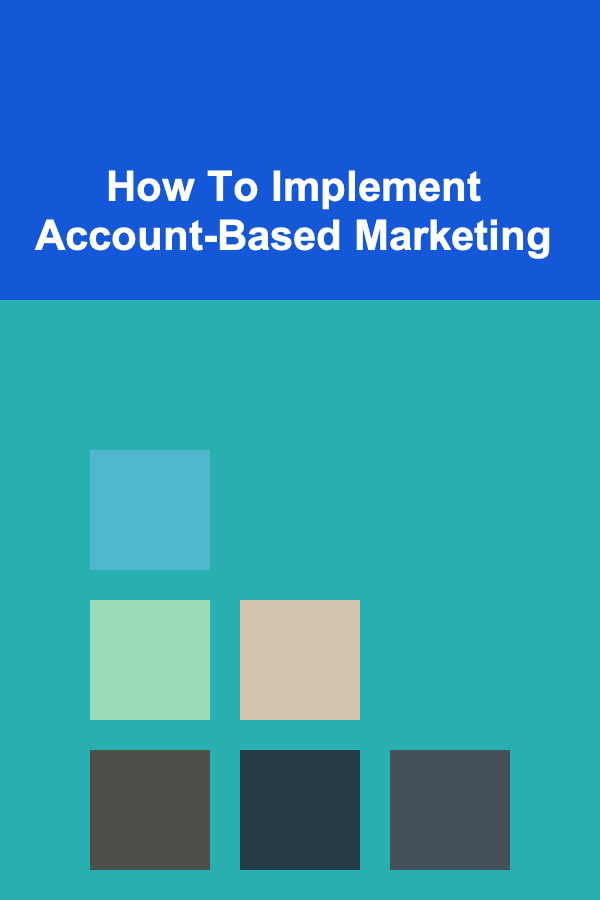
Building Your Personal Brand for Remote Job Search Success
ebook include PDF & Audio bundle (Micro Guide)
$12.99$7.99
Limited Time Offer! Order within the next:

In today's job market, remote work has become a preferred option for many professionals. As companies increasingly adopt flexible working arrangements, the demand for remote employees continues to grow. However, the competition for remote jobs is fierce, and standing out from the crowd requires more than just submitting a well-crafted resume or cover letter. It's about building and showcasing a personal brand that resonates with potential employers.
A personal brand is your professional reputation---it's how you present yourself online and offline, your values, skills, and the unique qualities that set you apart from others in your field. When seeking a remote job, your personal brand becomes an essential tool for getting noticed and securing the position. In this guide, we will explore actionable strategies for building and leveraging your personal brand to succeed in your remote job search.
Define Your Personal Brand
The first step in building your personal brand is understanding what it stands for. Ask yourself the following questions:
- What are my core strengths and skills? Consider what you excel at---whether it's communication, problem-solving, coding, design, or management.
- What makes me different from others? Identify the unique qualities you bring to the table, such as a particular area of expertise, a passion for innovation, or a track record of success in remote environments.
- What is my mission or purpose? Think about why you do what you do. What motivates you? What kind of impact do you want to have in your career?
Take some time to articulate your personal mission statement. This will be the foundation of your brand and will help you focus on the aspects that are most important to you and your career goals.
Example:
- Mission Statement: "I am a creative marketer with a passion for helping startups grow through innovative digital strategies. I focus on data-driven solutions and thrive in remote teams that value collaboration and creativity."
Once you've defined your personal brand, it will guide the content you create, the communities you engage with, and the way you present yourself during your job search.
Optimize Your Online Presence
Since remote jobs typically rely heavily on digital communication, your online presence will be one of the first things potential employers assess. This means you need to ensure that your digital footprint accurately reflects your personal brand. Here are key areas to focus on:
LinkedIn remains the most powerful platform for professional networking. Optimize your LinkedIn profile with the following elements:
- Professional Headline: Your headline is one of the first things people see. Make it clear and compelling. Instead of just stating your job title, include your key skills or what makes you unique. For example, "Remote Marketing Strategist | Data-Driven | Helping Startups Grow" speaks to your skills and what you offer.
- About Section: Use this section to tell your story. Explain who you are, what you do, and what you're passionate about. Align your summary with the mission statement you've created.
- Experience & Skills: List all relevant remote work experience, even if it was freelance or project-based. Highlight achievements and the specific skills you applied in each role.
- Recommendations: Ask colleagues or past managers to write recommendations for you. Social proof is vital in building credibility.
- Engage: Share relevant content, engage with others, and participate in conversations to showcase your thought leadership. Post about industry trends, share articles, or comment on others' posts.
Personal Website or Portfolio
Having a personal website or portfolio is an excellent way to demonstrate your expertise, especially if you're in a creative field, software development, or any job that requires a portfolio. Your website should include:
- About Me: An overview of your professional background, experience, and skills.
- Portfolio: A showcase of your best work, whether that's blog posts, design projects, case studies, or code samples.
- Blog: If you enjoy writing, a blog is an effective way to demonstrate thought leadership and expertise. Regular posts on industry topics can help establish you as a go-to resource in your field.
- Contact Information: Make it easy for potential employers or collaborators to reach out to you.
Social Media Presence
Apart from LinkedIn, other social media platforms can play a crucial role in your personal brand. Depending on your field, you may find Twitter, GitHub, Behance, or Dribbble useful. Use these platforms to:
- Share valuable content related to your field.
- Engage with thought leaders and companies in your industry.
- Showcase your work (e.g., code on GitHub, design on Behance).
- Participate in relevant conversations about remote work, tools, and trends.
By cultivating a consistent and professional presence on multiple platforms, you can further reinforce your personal brand.
Position Yourself as a Remote Work Expert
To successfully land a remote job, you need to prove that you're not just skilled in your field, but also an excellent fit for remote work. Remote jobs require specific traits, such as self-discipline, communication skills, and time management. Here's how to position yourself as a remote work expert:
Highlight Remote-Specific Skills
Employers hiring remotely value candidates who can thrive in an autonomous work environment. Highlight the skills that are critical for remote success, such as:
- Time Management: Showcase how you prioritize tasks and meet deadlines without direct supervision.
- Communication: Emphasize your ability to communicate effectively in a virtual setting, whether it's through written reports, emails, video calls, or collaborative tools.
- Tech-Savviness: Remote work often relies on technology, so highlight your proficiency with tools like Slack, Trello, Zoom, or project management software.
- Problem-Solving: Demonstrate your ability to solve problems independently and efficiently, a key skill for remote work.
Share Your Remote Work Experience
If you've already worked remotely, this is a massive advantage. Make sure to:
- Include Remote Jobs on Your Resume: Clearly state which positions were remote and describe how you managed to achieve success in those roles.
- Blog or Create Content on Remote Work: Share your tips, strategies, and experiences working remotely through blog posts or videos. This will show employers that you understand the unique challenges and benefits of remote work.
Engage in Remote Work Communities
There are various online communities dedicated to remote work, such as forums, social media groups, and websites like Remote.co or We Work Remotely. Joining these communities will help you stay up to date with trends, learn from others, and showcase your expertise.
Network Strategically
Networking is a key part of the job search, but remote job seekers face the challenge of connecting with people without the ability to attend in-person events. Fortunately, there are many ways to network online:
Join Industry-Specific Groups
Look for LinkedIn or Facebook groups that focus on your industry or the type of remote work you're seeking. Engage in discussions, offer advice, and learn from others in the group. Networking in these communities can lead to job referrals, collaborations, or partnerships.
Attend Virtual Conferences and Webinars
Many industries host virtual events that you can attend without leaving your home. These events often feature valuable networking opportunities and offer insights into industry trends. Use these events to connect with potential employers or collaborators.
Reach Out to Hiring Managers Directly
One effective way to get noticed is by reaching out to hiring managers directly. Send a personalized message expressing your interest in their remote positions, explaining why you would be a great fit, and offering to connect. Keep the message brief and professional.
Tailor Your Job Applications
When applying for remote jobs, you need to customize your resume and cover letter to each position. Here are some tips:
- Focus on Relevant Experience: Tailor your resume to highlight experience that aligns with the job description, especially if it's remote-related.
- Use Keywords: Many companies use applicant tracking systems (ATS) to filter resumes. Ensure your application includes relevant keywords from the job listing to pass the ATS filters.
- Showcase Remote Work Skills: In your cover letter and resume, emphasize the skills that are crucial for remote work, such as self-motivation, communication, and time management.
Conclusion
Building a personal brand is an ongoing process, but by focusing on the steps outlined above, you can increase your chances of landing a remote job that aligns with your skills and values. By defining your personal brand, optimizing your online presence, positioning yourself as a remote work expert, networking strategically, and tailoring your applications, you'll be well on your way to remote job search success. Start today, and let your personal brand shine through!

How to Ensure Accessibility for All Guests at Your Event
Read More
How to Set Up a Comfortable Ergonomic Study Area
Read More
How to Soundproof a Home for Better Home Entertainment
Read More
How To Implement Account-Based Marketing
Read More
How to Get Free Local Food Samples
Read More
Mastering Video Marketing on Every Platform
Read MoreOther Products

How to Ensure Accessibility for All Guests at Your Event
Read More
How to Set Up a Comfortable Ergonomic Study Area
Read More
How to Soundproof a Home for Better Home Entertainment
Read More
How To Implement Account-Based Marketing
Read More
How to Get Free Local Food Samples
Read More